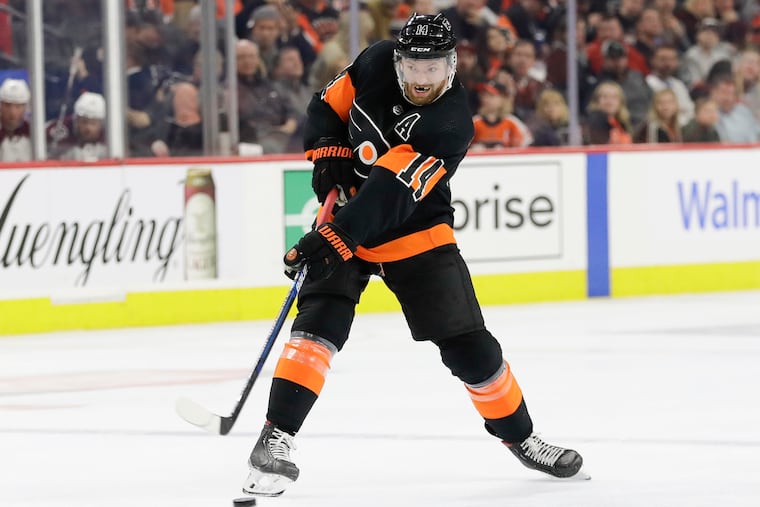Sean Couturier’s rise is the reason to think the Flyers can win the Stanley Cup | Mike Sielski
There was always going to be a telltale sign that the Flyers' rebuild had ended. Couturier's emergence as their best player is that sign.

Earlier this month, my colleague Ed Barkowitz made what should have been a simple request. The Flyers were about to announce their team awards, and Eddie got the idea to have those Inquirer writers who regularly cover the team cast their own “ballots” for each award. Who did we think deserved the Barry Ashbee Trophy as best defenseman? Who deserved the Pelle Lindbergh Trophy as most improved player? Eddie would compile our votes and post them on Inquirer.com and print them in the paper. Again, it should have been simple, and it was. For everyone else.
I breezed through the assignment without much thought. Of course Ivan Provorov was the Flyers’ best defenseman. Of course Scott Laughton’s emergence as a top-six forward made him a surefire choice for the Lindbergh. Let me get this finished. I have other work to do. Top three choices as the Flyers’ MVP? Carter Hart’s presence and play made a huge difference. Travis Konecny led the team in scoring. Claude Giroux was Claude Giroux. Is there someone else I’m forgetting? Nah. Type. Send. Done.
Oops.
What an award really means
On Monday, the NHL announced the names of the three finalists for the 2019-20 Selke Trophy. By the letter of its description, the award is given annually to the league’s “best defensive forward.” Really, though, the Selke recognizes the player who is regarded as the best all-around forward in the league. It’s not just that the forward, usually a center, can win faceoffs, kill penalties, and check the starch out of an opposing team’s superstar. No Selke winner has or would have scored fewer than 20 goals in an 82-game season in nearly 30 years. The guy has to be able to put the puck in the net, too.
Sean Couturier was one of the three finalists, for the second time in his career. And even if he doesn’t win the Selke – the Bruins’ Patrice Bergeron and the Blues’ Ryan O’Reilly, both of whom already have won it, were the other finalists – his nomination represents the latest piece of evidence for what everyone who follows the Flyers closely already knows: that he is their most valuable player and has been for a while now.
He scored 31 goals in 2017-18 and a team-high 33 in 2018-19. He was second on the Flyers in points this season, was on pace for 26 goals, led them in ice-time per game (19 minutes, 50 seconds), and spent more time on the ice in shorthanded situations (140:29) than anyone on the team.
He led the NHL in faceoff-win percentage (59.6%), meaning that whenever there was a key draw, one in which possession of the puck might influence or determine the outcome of a game, the Flyers had the player you’d most want to take it. He has won the Bobby Clarke Trophy, as the Flyers’ MVP, each of the last two years, and only a person who was either careless or suffering a momentary lapse of reason could have failed to acknowledge Couturier’s contributions this season.
(Ahem.)
The wait was worth it
The Flyers had 89 points in 69 games and were in second place in the Metropolitan Division when the pandemic hit, and it’s not a coincidence that they were having their best season in eight years at the same time that Couturier was reaffirming his status and importance to them.
Before this season, the Flyers went through seven years of mediocrity and rebuilding that tested the patience of both their ownership and their fan base. During that period, they missed the playoffs four times, cycled through four head coaches, and never won a postseason series – despite having two of the NHL’s most gifted and highest-paid forwards, Giroux and Jake Voracek.
A common accusation levied at the franchise, particularly at then-general manager Ron Hextall, was that the Flyers were wasting the prime years of Giroux’s and Voracek’s careers.
But Hextall had undertaken a far more challenging and time-consuming task than just spackling a few holes in the team’s roster. He was changing the franchise at its foundation, replenishing talent at every level of the organization, counting on players and prospects already on the team and within the farm system to mature and improve, recognizing that the Flyers had to withstand some hard years before they would have the depth to become and remain a bona fide Stanley Cup contender.
Couturier, as a third-line center who wanted a chance to take on more responsibility, was part of that young core, and there was a time when the Flyers would have been willing to trade away someone like him for a more experienced player who, the team believed, would make a greater and more immediate contribution. Hextall wasn’t willing.
In that context, given those goals, there was always going to be a telltale indication of when the rebuilding had ended: Giroux and Voracek could still be important players to the Flyers and probably would be, but they wouldn’t be the team’s most important players anymore, because they wouldn’t have to be. They would have aged, and their roles might have changed, and their playing time would have dropped a bit because there wouldn’t be the pressing need to rely on them so much.
Someone else would have taken on much of that burden. Someone else would have surpassed them. Someone else has.